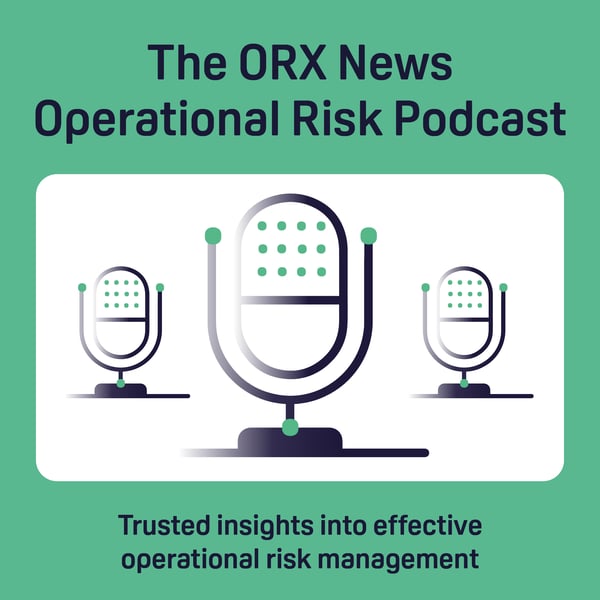Podcast
Discussing the Greenwashing Scenario Toolkit
29 March 2023
About the episode
In this episode of the ORX Operational Risk Podcast, the ORX Scenarios team take a look at the most recent publication in the ORX Scenarios service – the Greenwashing Scenario Development Handbook.
The handbook is a step-by-step guide to creating a greenwashing scenario and builds on previous work that ORX has done in the climate space. The team cover why they chose to focus on greenwashing, why this handbook and how it’s different to previous ORX Scenarios handbooks.
You can listen through Apple Podcasts, Spotify or anywhere else you get your podcasts from (search for 'The ORX Operational Risk Podcast').
"The handbook is a step-by-step guide to creating a greenwashing scenario and builds on previous work that ORX has done in the climate space, namely our 2021 paper entitled Climate and Operational Risk: The ORX Approach and our 2022 scenarios paper called Climate Change in Scenario Analysis."
Simon Johnson, ORX Scenarios Senior Manager
Episode resources
The Greenwashing Scenario Development Handbook is available for free to ORX Scenarios subscribers.
Listen to the full episode to learn more
This podcast is available on Apple Podcasts, Spotify or anywhere else you get your podcasts from (search for 'The ORX Operational Risk Podcast' to find us).
Podcast speakers

Simon Johnson
Head of Services, ORX

Robert Reay-Jones
Scenarios Senior Manager, ORX
Transcript
Simon Johnson: Hello and welcome to the latest episode of the ORX Operational Risk Podcast. My name is Simon Johnson, and I'm joined today by my colleague, Rob Reay-Jones.
Rob Reay-Jones: Hi, Simon.
Simon Johnson: Today, we will be talking about our most recent publication in the ORX Scenarios service, which is our Greenwashing Scenario Development Handbook. The handbook is a step-by-step guide to creating a greenwashing scenario and builds on previous work that ORX has done in the climate space, namely our 2021 paper entitled Climate and Operational Risk: The ORX Approach and our 2022 scenarios paper called Climate Change in Scenario Analysis.
So a very broad summary of the handbook is that it looks at how to prepare for, develop and manage a greenwashing scenario. In other words, it covers all the key stages and components of the process, from data sourcing to assessment and governance. And, I think this is the first publication of its kind to leverage actual industry data to take on the challenge of providing a really simple, yet comprehensive guide to scenario development in this space.
But the data is also evolving and I'm sure we’ll be coming back to our community in the not too distant future to revisit the topic and the handbook. But first things first. Let's look at why we chose the topic and how we approached it in a little more detail. So Rob, why greenwashing and why this handbook.
Rob Reay-Jones: So the idea for the handbook really stemmed from the fact that of the kinds of transition risks that matter to financial institutions, greenwashing really does seem to rank top. And you can see that in the fact that the regulatory environment, especially in Europe but also elsewhere, including North America, is more and more shifting its attention to making sure that institutions are both prepared for the new kinds of risks that climate change is giving rise to, and also adapting and responding to new expectations and new standards of behaviour and practice.
And what we've also seen internally at ORX is really clear evidence of the growing media focus on climate change and greenwashing. So, for example, our news team has been reporting for a while now on new types of loss events that really come out of that regulatory and societal scrutiny of institutions’ green and sustainability claims.
Simon Johnson: Yes. And I think that's one of the interesting things that came to the fore in the handbook. Greenwashing is a broader risk than at least I had initially realized. What I mean is that we began from the assumption that greenwashing is by nature a conduct risk - that involves deceit or misrepresentation. And our next assumption was that from an operational risk perspective, this would take the form of misselling.
So, in other words, a form of misconduct where one or several products are sold as being green or sustainable, but in their design and actual makeup, they fail to live up to that. What we found after looking at the data and also what our news team was reporting, is that actually what institutions, regulators and the media view as greenwashing is much broader.
It really does seem to be that misrepresentation piece in the widest sense. So everything from misleading the general public in very high street-type advertising campaigns to misleading disclosures and reporting to regulators. So misselling is only part of the equation, which means I think the institutions can take different approaches to greenwashing depending on their own risk exposure.
So Rob, I guess this handbook is potentially a bit broader than some of our previous handbooks. Are there other ways in which it differs?
Rob Reay-Jones: Yes, we have taken a slightly different approach on this occasion, But I mean, like our other handbooks, this really is one of our most practical outputs that we offer to scenario practitioners. In terms of the risk themes and types that we've covered so far in the series, we have handbooks on AML failures, cyber-related data breaches, I.T. outsourcing failures, pandemic risk and greenwashing scenarios.
So with this handbook, we've tried to innovate it in three different ways. The first and most significant difference is that we've actually built three full examples of what a complete greenwashing scenario might look like, and we've done that by drawing out what we see as the main building blocks that you should consider when you're looking at three different types of greenwashing.
And that's misleading advertising, misselling and misreporting. The second difference is that we've drawn more than previously on internal data, especially the ORX News database and editorials, to fill the data gap around transition and greenwashing risks, which is one of the main challenges in this space. The third thing we've done is that we wanted to provide a standardized view of the data to drive consistency in how the industry approaches greenwashing, given that it's still very much an emerging risk.
So we've drawn quite extensively on ORX taxonomies and libraries throughout the handbook to map the industry data to our standards.
Simon Johnson: Okay, so that makes sense. So I could easily imagine that institutions could use this when they are looking to prepare a greenwashing scenario or maybe figuring out who to involve internally.
Rob Reay-Jones: Yes, that's right. And you could also use the main section on development and assessment to support your work on each component of your scenario. So things like the scenario description - or what you might call the storyline - the main causes, the key control failures and of course the financial impacts and the drivers behind them, as well as how to tailor severity and likelihood.
I think another way of using the handbook is to use those full examples I mentioned to either review and challenge a scenario that you've already developed or perhaps validate it or even benchmark it against one of those examples. I think the final way in which the handbook could be used is to consider what type of greenwashing themed scenarios you should develop if you haven't already started out on the journey.
Simon Johnson: Okay, So it's good to hear that it can be used by institutions in all stages of the greenwashing scenario development process. As I said earlier, I expect we will continue to talk about climate change, risk and greenwashing in the future, both within the ORX Scenarios service and the wider ORX community. I also know that our news team is monitoring this space very closely, and Rob and I will continue discussions with our subscribers and look out for regulatory developments over the next 12 to 18 months.
Thank you, Rob, for your time. And thank you all for listening. If you have any questions for Rob or me about the handbook, please don't hesitate to get in touch. The handbook is currently available to ORX Scenarios subscribers only, but will be made available for non-subscribers to purchase soon. Please look out for this on our website and we will update the show notes with a link when it becomes available.
You can also find out more about our ORX Scenarios service by visiting www.orx.org.










